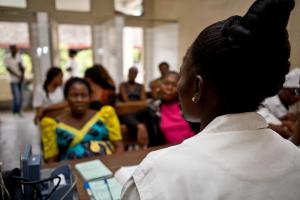Finding her courage after years of suffering
Tshikapa, Democratic Republic of the Congo – “He beat me for 30 years. Looking back, I wonder how I survived.”
For Patricia*, a 52-year-old resident of Tshikapa in Kasaï Province, the years of abuse suffered at the hands of the one who was supposed to be her life partner form a sombre memory.
“He wasn’t always that way,” she says. “But once he started coming home drunk, he lost control. He began beating me, and eventually it became the norm – he’d beat me at any moment, even in front of our kids.
“At night, he used to bar the front door and force me to stay outside. He kept on mistreating and humiliating me, no matter how any times our families tried to intervene. Even our children kept begging me to leave. It was tough for me.”
Fed up, Patricia sought help at the Women in Action Development Support Centre, a Tshikapa-based NGO that supports female survivors of violence in the Kasaï region. With the guidance of its director, Julienne Lombe, Patricia was able to extricate herself from a situation that once seemed inescapable.
According to the Demographic and Health Survey 2013-2014, 52% of women in the Democratic Republic of Congo have suffered physical violence from the age of 15. Some 68.2% of women have experienced physical, sexual or emotional abuse within a relationship, and 13% of pregnant women have endured violence while pregnant. The country’s worsening humanitarian situation, with conflict and mass population displacement, as well as multiple epidemics of Ebola, measles, meningitis and COVID-19, have further destabilised health systems, impacting women who suffer gender-based violence.
The World Health Organization (WHO) supports the health response contained in the government’s multisectoral response, says Dr Lily Mokako, Chief of the Special Division for the National Reproductive Health Programme in the Ministry of Public Health.
“With WHO support, we have developed a National Strategy, training tools and templates to address gender-based violence, including violence committed by an intimate partner,” she says.
WHO support also includes capacity building for gender-based violence responders who are now better equipped in the field, as well as support for first responders caring for women and girls who have suffered sexual or intimate partner violence.
“Care is centred on the survivor,” says Dr Mokako.
From 2020 through March 2021, more than 500 health workers, activists, police recruits and NGO workers were trained in Mbuji Mayi, Tshikapa, Kananga and Kinshasa. A group of 38 trainers were also trained in Kinshasa in February 2020.
Maria Caterina Ciampi, a WHO Regional Advisor on gender-based violence in emergency situations in Africa, led the training of trainers.
“Those trained are in direct contact with at-risk women and girls, as well as with survivors. The goal for us was to ensure the sound implementation of WHO recommendations, guidance and technical tools in humanitarian crisis situations throughout the health system, especially in the Kasaï region after the Kamwina Nsapu humanitarian crisis,” she says.
Upgrading her skill set via this training, Julienne Lombe says, has made a marked difference.
“It’s allowed us to strengthen and better structure our support to survivors of violence,” she says. “We learned how to help them avoid falling into the ‘spider’s web’ of obstacles and challenges that a survivor can encounter when systems meant to support them aren’t effectively organized. Shuttled from system to system, she can end up entangled in a bad situation, not knowing who to turn to or how to escape.
“Our systems are now based on the needs of the survivor, with a simplified response system.”
This noted improvement extends to the medical and psychological response as well, says Dr Bernadette Mbu, National Advisor on gender-based violence at the WHO office in Democratic Republic of Congo.
“During the trainings, we noticed that many participants were under the impression that survivors didn’t necessarily need psychological support. Nothing could be further from the truth,” she says. “In addition to the lifelong handicaps and bodily wounds, these women continue to live with psychic trauma long after the violence they have endured.
“We’re pleased to note that this element of the response has considerably improved in the field.”
Despite these advances, however, numerous cases of domestic violence remain unreported. The Demographic and Health Survey reports that 49% of survivors never seek help nor discuss their ordeal with anyone, and 61.5% of women approve of a husband or partner beating his wife or companion.
Patricia is dismayed by these figures.
“Our women suffer enormously but remain silent. The taboo around domestic violence perpetuates these intolerable situations and our customs normalize violence inflicted by the husband,” she says.
Seeking to give the kind of support she herself once received, Patricia remains on the alert for women who are living with domestic violence.
“I share my experience and try to help. I know first-hand that without help, there’s no easy way out.”
She savours her new lease on life after decades of suffering.
“I finally realized that my life has too much value to sacrifice it to someone bent on my destruction,” she says. “I have a new life now, and I quite like it!”
----------------------------------------
* Name has been changed.
Communications Officer
WHO DRC
Tel : +243 81 715 1697
Office : +47 241 39 027
Email: kabambie [at] who.int (kabambie[at]who[dot]int)
Communications Officer
WHO Regional Office for Africa
Email: dialloka [at] who.int (dialloka[at]who[dot]int)




